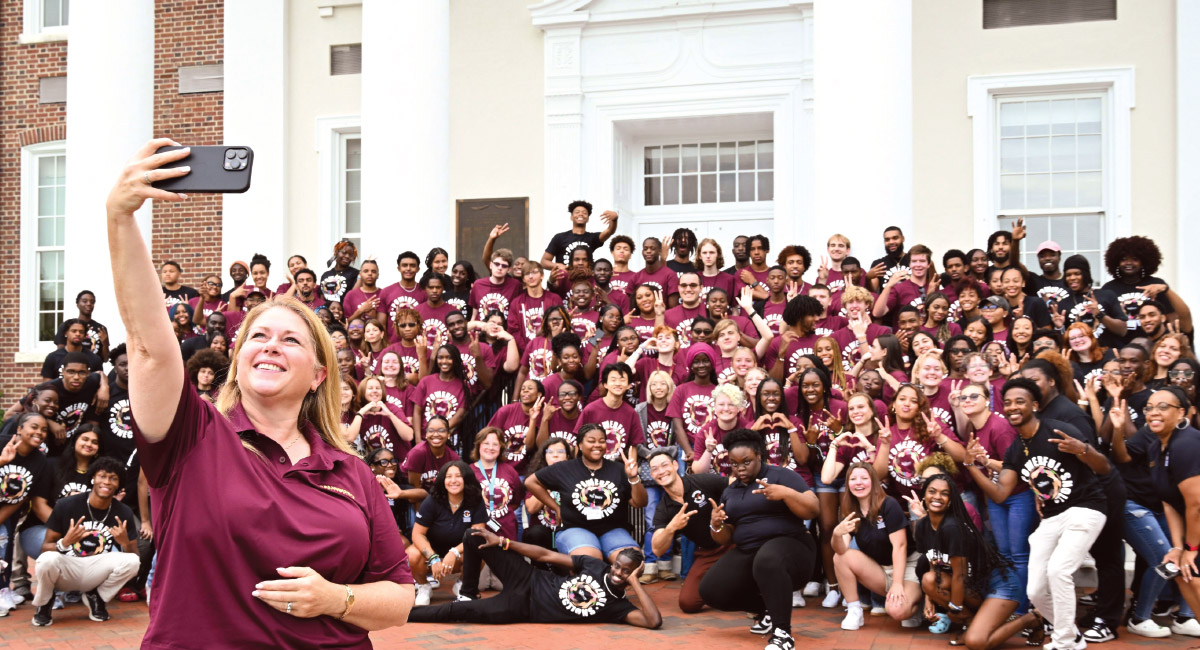Starting With Pre-Semester Programs,SU Experiences Help StudentsMAKE CONNECTIONS FOR A LIFETIME
When Amiyah Brunson began her first semester at Salisbury University last fall, she didn’t yet know her schedule or classroom locations. What she did know was that there were many faculty, staff and students she could turn to for support, thanks to SU’s Powerful Connections (PowCon) program.
Brunson was one of 100 students enrolled as part of the largest cohort in the program’s two-decade history. As a pre-semester experience run by the Office of Diversity and Inclusion (ODI), Powerful Connections is a vital tool for new SU students.
“Powerful Connections plays an important role in successfully supporting students through the transition to university life,” said SU President Carolyn Ringer Lepre (pictured left with the 2023 group). “Activities and programs help to orient students of various backgrounds with an understanding of the academic experience and our campus. Ensuring SU is a welcoming place for all is at the core of our mission.”
[Powerful Connections] teaches you leadership development and it connects you with alumni, faculty and staff. It is a conversation starter. I am still friends with folks from the program.”
– Vanice Antrum
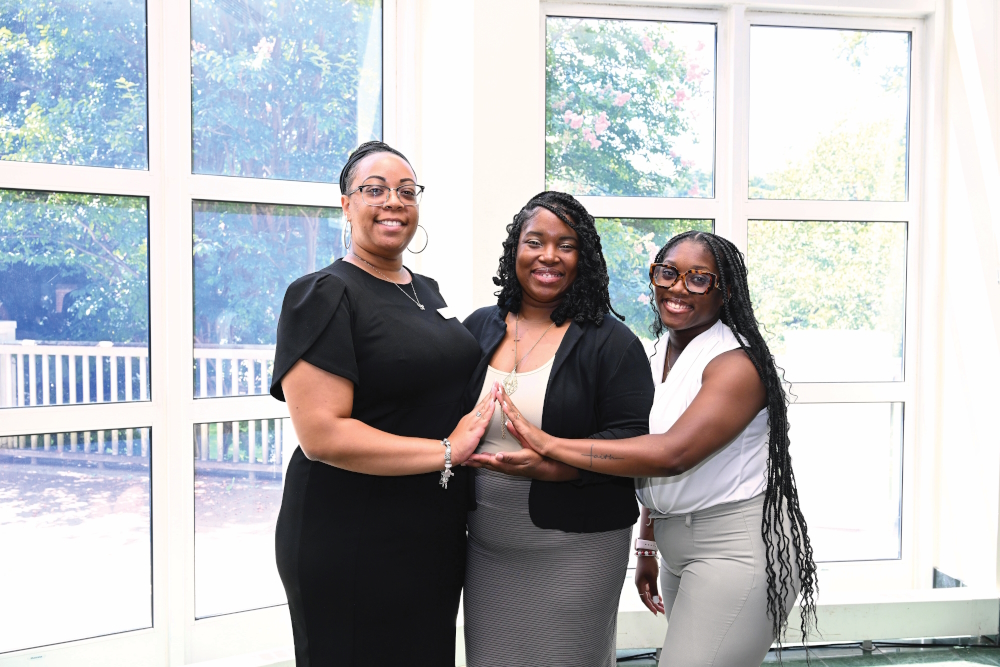
Ayonna Brunson
Brunson began seeing the impacts of the program right away.
“When I first got here, I felt like I wasn’t going to make any friends,” she said. “But by the third day, I’d made a bunch of friends. I felt so connected. It felt like we were already a family.”
Brunson’s sister, Ayonna, is a PowCon coordinator and secondary education and mathematics major. But, three years ago, she was in her sister’s shoes.
“Powerful Connections helped me with getting connected,” Ayonna said. She learned about student organizations, including the Black Student Union, and connected with other mentees. This provided her a support system on campus.
SU Director of Multicultural Affairs Vanice Antrum ’12, M’14 also was a Powerful Connections mentee and mentor – and led the program for four years.
“Personally, doing the program was extremely helpful because you get a built-in community, you get a mentor, and there’s an academic component of checking on your progress,” she said. She also benefitted from hearing about leadership roles and scholarships.
“There were a lot of targeted deep connections to opportunities on and off campus,” she explained. “Also, it teaches you leadership development and it connects you with alumni, faculty and staff. It is a conversation starter. I am still friends with folks from the program.”
Ayonna and Amiyah’s mother, Dr. Undrea Blake ’05, principal of Wicomico High School in Salisbury, served as a guest speaker for this year’s Powerful Connections cohort.
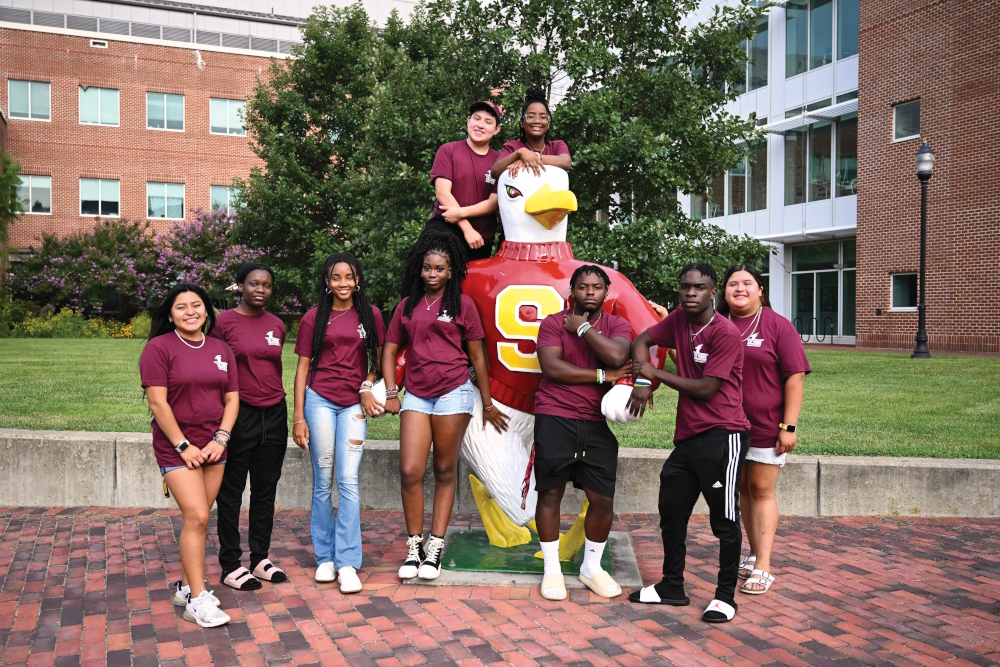
Powerful Connections doesn’t exist just to ‘help’ students. What we’re doing is creating generational and systemic societal change.”
– Robby Chin
“Coming to SU was one of the greatest choices that I have made,” she said, noting that the small classes, approachability and reputation of faculty, and ability to meet new people made her experience as a student ideal.
Her advice for students was this: “Get involved in the activities SU has. Ask questions, and don’t be afraid to ask for help because at some point, we all need help to reach our goals.”
Zion Powell, a PowCon mentee, took those words to heart.
“I’m glad that I got the opportunity to learn more about SU before classes started,” said the first-year geography major. “Meeting my dean, exploring campus and making friends allow me to have those ‘powerful connections.’ If I’m struggling in my courses, I know who I can call.”
Program mentors like Jahnaiya Sutherland, a data science major and Clarke Honors College student, is one of those people.
“Being a mentor has allowed me to do for others what people have done for me: Be a leader who someone can connect with,” she said. Especially for students of color, PowCon “kickstarts their engagement and involvement.”
Sutherland herself has served in leadership roles for the SU NAACP and Multicultural Alliance. She encourages mentees to similarly get involved, knowing that she and others are there to help.
 Connecting In Other Ways
Connecting In Other Ways
Powerful Connections is just one way SU is helping students make connections. Dedicated faculty and staff mentors and other targeted programs also aim to support students’ success at SU, and as they launch careers or pursue advanced degrees after graduating.
Other pre-semester programs are led by SU’s College Assistance Migrant Program (CAMP), Disability Resource Center (DRC) and TRIO Student Support Services.
“We’ve been running our CAMP Welcome Lunch for our new students and their families; however, this year we were more proactive about providing our program in Spanish and Haitian-Creole,” said Nina Soto Ramirez, CAMP director. Separate information sessions in each language also allow families to ask questions.
The DRC’s STARS (Student Transition, Access, Retention and Success) Program fosters an inclusive environment with respect for all differences, helping provide incoming students with disabilities with resources.
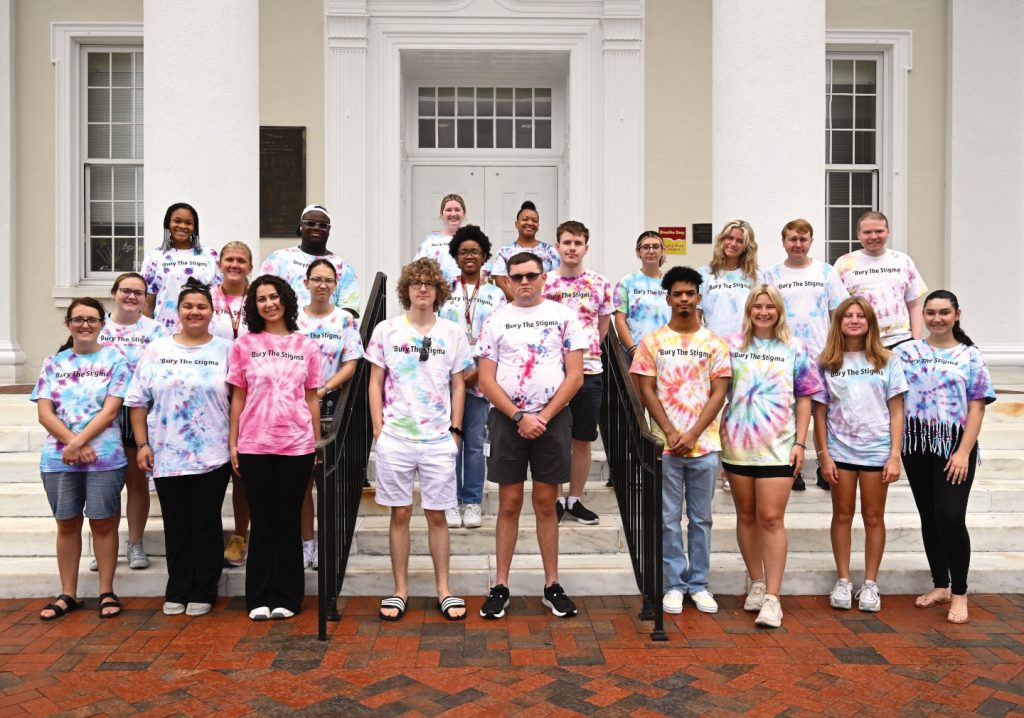
“The majority of our student mentees have high retention rates,” said Jalesa Hull, DRC assistant program director. “Students have shared that they feel more prepared for the semester. They have our department and a knowledgeable peer mentor to guide them.”
Information systems alumnus and past mentor Nick Kautz ’23 said: “We introduce students to all the DRC has to offer in a three-day program. It was a joy to watch my mentees grow from nervous newcomers to successful students active in campus life.”
Biology alumna and past mentee Rebecca Pritt ’23 agreed that the program provided her all the information she needed for success.
“I immediately felt welcomed into a supportive community,” she said.
TRIO’s Scholar Bridge program is another pre-semester effort that has grown to serve some 20 students annually in recent years, said Dr. Margaret Sebastian, TRIO director.
“TRIO focuses on the intersection between first generation, low income and students with disabilities because the barriers you have with those three identities are paramount,” she explained.
The TRIO Scholar Bridge Program explores the required skills of academic transition, course selection, financial literacy, FAFSA, graduate school and professional development, as well as the more “hidden curriculum” of higher education, Sebastian said, such as how to interact with faculty and staff.
The program also has focused on the value of making Salisbury and the Eastern Shore “home.” This year, that meant providing tours of the city and history of the land, as well as learning the locations of bus stations and shuttles, and fun regional activities.
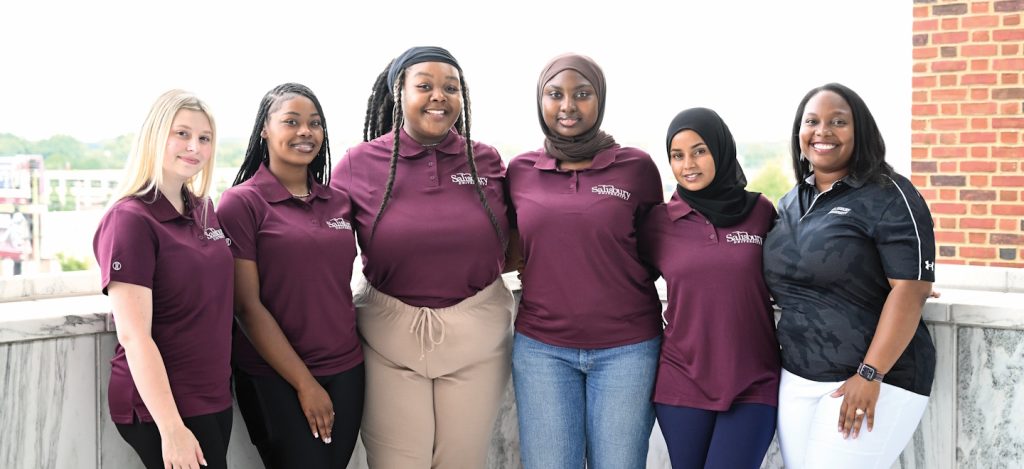
“Coming to SU was one of the greatest choices that I have made”
“We took them to places to show them you can build a life here; you can build a good foundation here,” Sebastian said. During a roundtable, faculty and staff also told their stories of being first generation.
“The summer TRIO program helped me get out on my own more since I am a transfer student,” said I’yanna Wilson, a social work major. “SU has provided me a great education, and professors and staff help me when I need it.”
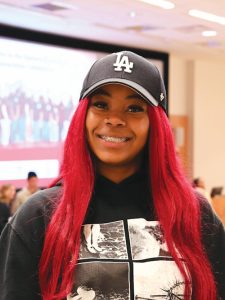
SU nursing major Niya Joseph said TRIO has helped her financially, emotionally and academically, and now she is a TRIO ambassador.
“Since I started working here, it is teaching me important life skills that I will use even past college,” she said, like learning how to handle conflict, depend on a team, communicate and dress professionally. “Another great thing about TRIO is that you’re allowed room to grow. As a first-generation student it is hard to believe in yourself and have the courage to continue your journey in college, but having good people around you makes a difference.”
Ariel Simbana-Criollo, who comes to SU from Ecuador, is a TRIO graduate assistant who helps TRIO ambassadors, and the students who rely on them. Personally, he said SU has given him many opportunities since he started the Master of Social Work Program.
“I could join groups and programs that would enrich my professional and personal development from the beginning,” he said, including the Comunidad and Umoja Scholar Program, Organization of Latin American Students, and Behavioral Health Integration in Pediatric Primary Care internship program. “These experiences have helped me grow.”
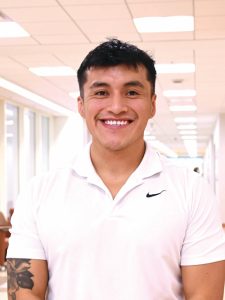
 A Tradition of Connection
A Tradition of Connection
All of SU’s pre-semester programs have roots in long-standing summer experiences, which provide opportunities for incoming students to form connections before starting classes.
Achieve at Assateague visits the national seashore, while Bike, Beach and Beyond explores Salisbury via bike and a service project. Other students have connected through the Algonquin Canoe program to Canada, which started 40 years ago.
A model for other universities, that program was named a Distinguished Program for Student Services by the Maryland Association for Higher Education in 1986. The honor stemmed in part from the high graduation rates, strong campus involvement and academic success of participants.
Powerful Connections was pre-dated by a Mosaic summer experience and other pre-matriculation efforts as far back as 1989, said Dr. Vaughn White, former director of Multicultural Student Services. Mosaic students explored equity and diversity topics through trips to experience the Holocaust Museum, as well as African American colonial history.
Over the decades, SU has continued this tradition of helping students more easily transition to college life and supporting their success once they begin classes.
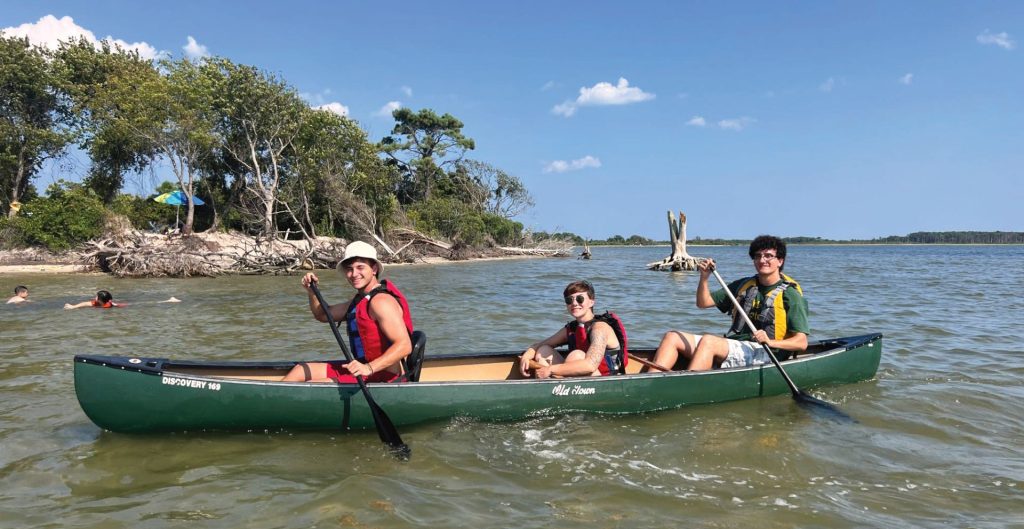
Sheree Satchell ’09, M’11, coordinator of student diversity, recruitment and retention for ODI, was a PowCon mentee in 2005.
“The PowCon program was pivotal in connecting me with resources on and off campus that led to my successful matriculation,” she said. “The students and staff that I met in the days leading up to classes were the primary reason I persisted to graduation at SU. I am most certain that I would have transferred had I not been able to come to campus early and formulate connections that would serve as my nucleus while here.”
Satchell said her mentor’s intentionality in getting to know her, and connecting her, helped her grow in confidence. She became active in clubs and organizations on campus and locally, and she traveled to student leadership conferences.
“PowCon provided me with a space to be seen, heard and known, to a degree that superseded my expectations,” Satchell said. “Research has shown that ‘belonging’ in any environment, but specifically within the academic realm, has been connected to higher achievement, persistence in college, and lower rates of depression and anxiety. As was true for me, ODI and PowCon remain a place for all students to come as they are, and receive the support, resources and tools that they need to excel at SU and beyond!”
 Helping First Generation Students
Helping First Generation Students
A current priority at SU is helping support the success of students who are the first in their families to attend college. Last fall, SU welcomed some 1,400 new students in the Class of 2027– and nearly half identified as first-generation.
Political science major Dylan Rivera is one. He said he didn’t have much help with the application process, but now that he’s at SU, he hopes he is making his parents proud.
“While only a freshman, I already made a lot of meaningful connections,” he said. “I am a part of Model United Nations and the Student Government Association. My political science class had a guest who talked about a seminar with The Washington Center, which I applied for and got. This will help my career and help me understand how government functions.”
International business major Olivia Norris also is first- generation student. TRIO’s Scholar Bridge program helped ease her worries about what to expect at college.
“It helped build a foundation for a successful first semester and provided me early on with a support network,” she said. “This opportunity means the world to me. It means I can pave the way for my future, open doors to more opportunities for myself, and be a role model for my younger sister.”
In November, SU hosted some 65 high school and transfer students for the inaugural Eastern Shore First Generation Conference, designed to show them what four year institutions have to offer. Last fall, SU’s Office of Diversity and Inclusion launched its First Gen Sea Gull Scholars program as part of efforts to ensure students’ success and sense of belonging at SU.
“We have social engagement, as well as academic and resource opportunities,” Antrum said. “We are trying to expose students to things they may not know since others in their family haven’t had this experience. We are trying to say: ‘let us help put you on a pathway to success.”
Topics for First Gen Fridays have included Mental Health Matters and Exploring Financial Aid. Spring topics will explore Career Services, Fellowships and Research, and Financial Literacy.
Students also had the chance to attend First Gen Meetups that provide one-on- one connection with a first-generation faculty mentor. These explored what it means to be first gen and how to build support networks. SU faculty and staff also were surveyed about their experiences and support.
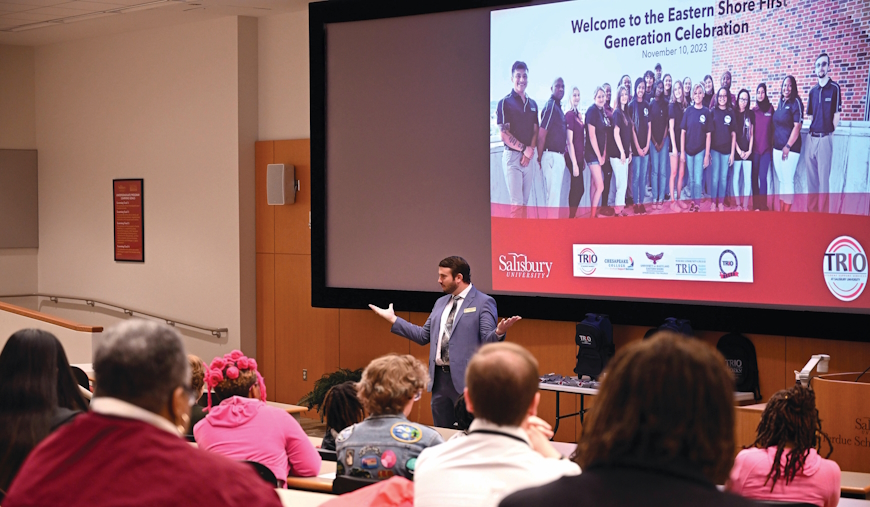
“…let us help put youon a pathway success.”
 Creating Opportunities
Creating Opportunities
Looking back on her experiences as a Powerful Connections mentor, SU alumna Cearrah Sherman ’18, M’21 said it helped her learn how to be a good mentor to others after SU. Now enrolled in a doctoral program at University of Maryland, Baltimore, Sherman said she’s seen PowCon alumni build relationships outside of SU, for business opportunities, community service and more.
“I have gone back to campus several times to speak with current students, and I love the interactions,” she said. “SU helps students be successful with offices to address many different needs. There are so many activities and organizations to get involved in.”
Robby Chin ’11, program administrative specialist for ODI, also sees firsthand how Powerful Connections and other programs are impacting students’ mindsets.
“Powerful Connections doesn’t exist just to ‘help’ students,” he said. “What we’re doing is creating generational and systemic societal change.
“PowCon achieves that by encouraging our students to value every human interaction. It changes the way they see, perceive, greet, speak with and treat people – not just their peers, but their faculty, staff and everyone they experience outside the SU campus.
“I feel so grateful to have the opportunity to contribute to the success and actualization of potential of this generation of Sea Gulls, global citizens and community contributors.”
Sebastian echoed this: “We are trying to communicate with students that it is okay to need help. I tell students, ‘I care about your future and I want to connect you with people who can help your future come to life’.”
This support begins at the top at SU, as President Lepre has emphasized: “We are a family at SU. A family that cares about one another and works toward a common goal – creating an environment in which every student has what they need to achieve success.”
